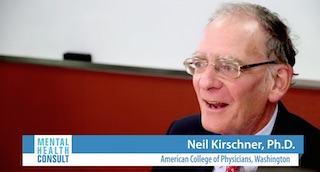User login
Neil Kirschner, Ph.D., senior associate for health policy and regulatory affairs for the American College of Physicians, explains why the solo practitioner model of health care needs to give way to collaborative care. “Care is turning into a team-based approach [that] allows you to have staff to provide effective integration of care, but to have a team, you need funding,” he says. “One-third of our health care spending is on ‘wasted care’ … [and that money] could be leveraged toward providing effective care.”
The video associated with this article is no longer available on this site. Please view all of our videos on the MDedge YouTube channel
Neil Kirschner, Ph.D., senior associate for health policy and regulatory affairs for the American College of Physicians, explains why the solo practitioner model of health care needs to give way to collaborative care. “Care is turning into a team-based approach [that] allows you to have staff to provide effective integration of care, but to have a team, you need funding,” he says. “One-third of our health care spending is on ‘wasted care’ … [and that money] could be leveraged toward providing effective care.”
The video associated with this article is no longer available on this site. Please view all of our videos on the MDedge YouTube channel
Neil Kirschner, Ph.D., senior associate for health policy and regulatory affairs for the American College of Physicians, explains why the solo practitioner model of health care needs to give way to collaborative care. “Care is turning into a team-based approach [that] allows you to have staff to provide effective integration of care, but to have a team, you need funding,” he says. “One-third of our health care spending is on ‘wasted care’ … [and that money] could be leveraged toward providing effective care.”
